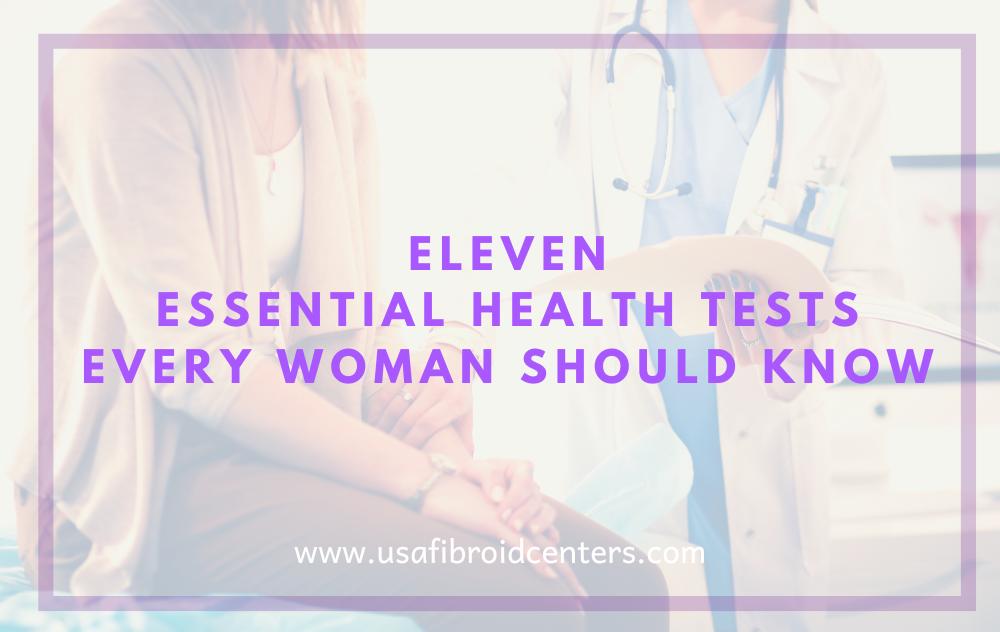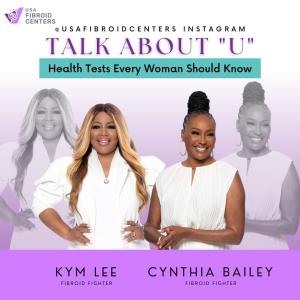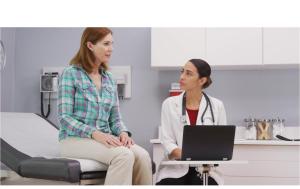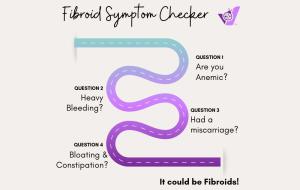
Knowledge is Power
October is Breast Cancer Awareness Month, but women should also know about their risk for uterine fibroids. These benign tumors are very common, affecting up to 80% of women at some point in their lives. Early detection and treatment of fibroids can help to improve women’s quality of life and prevent serious complications.
At USA Fibroid Centers, we believe that informed women make the best decisions about their care. That’s why we’re committed to providing women with the information they need about fibroid treatment options. We want women to know that they have choices and that they can find a treatment plan that’s right for them.
USA Fibroid Centers’ ambassadors, Actress Cynthia Bailey, and Celebrity Make-Up Artist Kym Lee discuss health tests every woman should know on the Instagram Live program Talk About “U“.

What Should I Be Aware Of?
With all the information on the Internet, it can be difficult to decipher what medical screenings are especially important for women. Here are the top 11 women’s health tests and exams to be aware of throughout your life:
1. Fibroids
If you are experiencing symptoms like prolonged menstrual cycles, excessive bleeding, and severe menstrual cramps, it could be uterine fibroids.
Check your symptoms using our Uterine Fibroid Symptom Checker.
 2. Pap Smear
2. Pap Smear
A pap smear tests for various women’s health conditions, including HPV and cervical cancer. This test is performed every three to five years for women between the ages of 21-65. Pap smear tests screen for abnormalities and lower the risk of developing cancer.
3. Pelvic Exam
Pelvic exams are performed to make certain that a woman’s reproductive system is healthy. During a pelvic exam, the doctor checks the vagina, cervix, fallopian tubes, vulva, ovaries, and uterus. Some doctors perform a pelvic exam during a routine pap smear. However, you can request a pelvic exam at any time if you notice changes in menstruation, pain during sexual intercourse, abdominal pain or cramping, difficulty emptying your bladder, frequent urination, chronic constipation, etc. A pelvic exam can diagnose endometriosis, uterine fibroids, and adenomyosis. If you are diagnosed with uterine fibroids or ADENOMYOSIS, it’s important to see an Interventional Radiologist who can conduct further tests like an ultrasound or MRI to locate and treat the condition.
Consult with a Fibroid Specialist
4. Mammogram
Mammograms are recommended for women between the ages of 40-50; however, if you have an increased risk for breast cancer in your family, your doctor may recommend getting tested earlier and more frequently. Mammogram tests use low-energy X-rays to examine a woman’s breast. The X-ray can pick up masses throughout the tissue.
5. Skin Exam
Skin exams vary for each person depending on how often you’re exposed to harmful UV rays. Even if you are not out in the sun very long, women should track the changes in moles to prevent skin cancer like melanoma. Check your body with a standing or hand mirror for new moles when you’re getting in or out of the shower. It’s important to check yourself monthly; especially in spots you may not see every day, like your back or behind your neck.
6. Diabetes Screening
Doctors recommend a Type 2 Diabetes screening for adults 35-70; for individuals who have an increased BMI (body mass index), diabetes blood tests are recommended every three years. Two tests are used to screen for Type 2 diabetes: fasting plasma glucose and oral glucose tolerance tests.
7. Physical Exam including Blood Pressure and Cholesterol

Physical exams are one of the most important yearly tests. This is a good time to update your medical records, ask your doctor questions, change medications, request a mental health exam or treatment, schedule important tests, and get crucial vaccinations. Doctors typically start measuring your blood pressure and cholesterol when you turn 18. This is also a good time to measure pulse, weight, risk for fibroids and other diseases and overall health.
8. Colon Cancer Screening
The number of people affected by colon cancer has increased significantly. A colonoscopy is a test performed so the doctor can look into the colon for polyps or cancer. This is an important part of women’s health. The doctor can remove polyps or other tissue for examination during the procedure. Doctors recommend both men and women get screened at the age of 50.
9. Osteoporosis and Bone Density Screening
Screening for osteoporosis helps to estimate the density of your bones and the likelihood of breaking a bone. Bone density tests are typically recommended for the hip and spine. A DXA (dual-energy x-ray absorptiometry) machine is used to diagnose osteoporosis and determine your risk. Women should get a bone density test usually by age 65.
10. STD/STI Screening
Reproductive health is important for women of all ages. You can prevent the spread of harmful STDs/STIs (sexually transmitted diseases and infections) by getting screened yearly. All women planning to get pregnant or pregnant are recommended to be screened for HIV as well.
11. Thyroid Test
Doctors typically recommend women undergo a thyroid screening if they are 60 years or older. Women planning to get pregnant are also recommended to have their thyroid checked for abnormalities. Tests for an overactive thyroid are called: T3, T3RU, T4, and TSH. An over-active thyroid can lead to serious health concerns like extreme weight loss or irregular heartbeat.
Your Health Is in Your Hands
It’s important to write down and track changes in your body to ask questions and bring up symptoms to your doctor that may indicate an underlying issue. It’s helpful to stay on top of the tests you’ve done, and take the initiative to finish them. Power is speaking up when something is wrong and finding a solution that makes you feel confident.
If you have questions during screenings or want to learn more about the test being performed, ask your doctor and do your research.
If you want to learn more about uterine fibroids and treatment, call us at 855.615.2555 or click below to schedule your appointment online.




